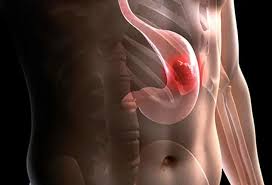Upper Abdominal Cancer
Upper abdominal cancer refers to malignancies that develop in the organs located in the upper abdomen, including the liver, pancreas, stomach, gallbladder, and parts of the small intestine. These cancers can be aggressive and challenging to treat, but advancements in medical technology have significantly improved detection, treatment options, and overall patient outcomes.
At our Cancer Clinic, we are committed to providing comprehensive, patient-centered care that focuses on early diagnosis, personalized treatment plans, and holistic support for patients and their families.

Types of Upper Abdominal Cancer
1. Stomach Cancer (Gastric Cancer)
Stomach Cancer, also known as gastric cancer, originates in the lining of the stomach and often develops slowly over many years and can spread to the nearby organs . The most common type is adenocarcinoma, which begins in the mucus-producing cells. Risk factors include Helicobacter pylori infection, smoking, high-salt or smoked food consumption, family history of gastric cancer, and chronic gastritis. Symptoms may include persistent indigestion, stomach pain, loss of appetite, nausea, unexplained weight loss, and blood in the stool. Diagnosis is typically confirmed through endoscopy and biopsy, along with imaging for staging. Treatment options include surgical removal of part or all of the stomach, chemotherapy, radiation therapy, and targeted therapies depending on the stage and molecular profile of the tumor. Early detection significantly improves outcomes.
- Symptoms:
- Difficulty swallowing
- Persistent indigestion or heartburn
- Blood in stool (Black stool)
- Feeling bloated after eating small amounts of food.
- Nausea
- Weight Loss
Tumors of proximal stomach, distal stomach, body of the stomach, greater and lesser curvature are treated differently based on TNM status.
Tumors of gastro esophageal junction have different tumor biology, so treated differently.
2. Gallbladder Cancer
- Description: A rare cancer that starts in the gallbladder tissue. It is more common in older individuals and is often discovered incidentally during gallstone treatments.
- Causes :Gallbladder cancer is primarily associated with long-standing gallstones, which cause chronic inflammation and damage to the gallbladder lining. Other significant risk factors include gallbladder polyps—particularly those larger than one centimeter—and a condition known as porcelain gallbladder, where the wall of the gallbladder becomes calcified. Chronic infections, especially with Salmonella typhi (seen in typhoid carriers), and congenital abnormalities like choledochal cysts also contribute to cancer risk. Lifestyle factors such as obesity and high-fat diets are linked due to their role in gallstone formation and hormonal imbalances. Additionally, occupational exposure to certain industrial chemicals, a family history of gallbladder disease, and being female or over the age of 60 further increase susceptibility to this rare but aggressive cancer.
Current data is implicating micro plastics in the causation of gall bladder cancer.
- Symptoms:
- Abdominal pain, particularly in the upper right side
- Nausea or vomiting
- Jaundice
- Abdominal swelling
- Unexplained weight loss
3. Small Intestine Cancer
Small Intestine Cancer is a rare form of gastrointestinal cancer that originates in the tissues of the small bowel, particularly in the duodenum, jejunum, or ileum, which plays a key role in nutrient absorption . It includes several types such as adenocarcinoma, carcinoid tumors, lymphoma, and sarcoma. The causes are not entirely understood but may include genetic predispositions, chronic inflammatory conditions like Crohn’s disease or celiac disease, and diets high in red or processed meats.It is relatively rare and may be associated with genetic predispositions such as Lynch syndrome as well. Symptoms often appear late and may include abdominal pain, unexplained weight loss, blood in the stool, nausea, vomiting, and signs of intestinal obstruction. Early diagnosis is challenging, but endoscopy, imaging, and biopsy are essential tools. Treatment typically involves surgical resection, sometimes followed by chemotherapy or radiation depending on the cancer type and stage.
- Symptoms:
- Abdominal cramps or pain
- Nausea or vomiting
- Blood in stool
- Unexplained weight loss
- Fatigue
4. Salivary Gland Cancer
-
- Swelling or lumps in the neck or facial region
- Persistent pain in the facial area
- Facial numbness or muscle weakness
- Difficulty swallowing or opening the mouth
5. Cervical Esophageal Cancer
- Difficulty swallowing (dysphagia)
- Pain or discomfort in the throat
- Persistent cough or hoarse voice
- Weight loss or nutritional deficiencies
6. Skin Cancers of the Neck (Melanoma and Squamous Cell Carcinoma)
- Changing or unusual skin lesions
- Bleeding, crusting, or persistent sores
- Skin discoloration or rapid lesion growth
- Itching or tenderness at affected area
Treatments and Outlook
Our team combines advanced oncological expertise with a patient-centered approach to deliver comprehensive cancer care. We provide advanced, patient-centered cancer care, focusing on effective treatments that minimize physical and emotional impacts while preserving quality of life. Our holistic approach includes personalized strategies, emotional support, pain management, nutritional counseling, physical therapy, and stress management. Rehabilitation programs, such as post-surgery therapy, mobility assistance, and holistic options like yoga and meditation, empower patients to recover with strength and confidence, promoting overall healing of both body and mind. Our clinic employs a multidisciplinary approach to treat upper abdominal cancers, combining advanced medical therapies with holistic care.- Curative Surgery: Removal of tumors or affected organs when cancer is localized.
- Organ preserving surgeries when indicated.
- Palliative Surgery: Relieves symptoms and improves quality of life in advanced stages by addressing complications such as obstructions or bleeding.
- Uses drugs to destroy cancer cells, shrink tumors, and prevent recurrence. Chemotherapy can be administered orally, intravenously, or directly into the affected organ.
Beyond clinical treatments, we provide emotional and psychological support, counseling, nutritional guidance, and rehabilitation programs to help patients navigate their recovery journey.
Results
Want to learn more about your diagnosis? We offer comprehensive oncology services for diagnosis, therapy, rehabilitation, and personalized support.
